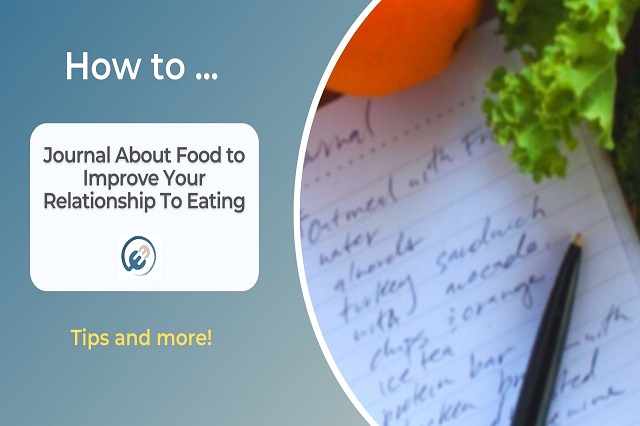
When it comes to getting the most out of your diet, many people focus solely on counting calories.
While keeping track of your caloric intake is important, it’s not the only thing you should be monitoring when you’re trying to eat healthier.
In this blog post, we’ll discuss the benefits of journaling your diet and provide tips for how to do it effectively.
Food is more than calories
Many people think of food in terms of weight loss and weight gain.
But there’s so much more to food than calories!
There’s also hunger, fullness, satisfaction, nutrition, and mindfulness. Being able to eat with friends and family without feeling guilty is important, too.
And finally, your diet should give you peace of mind – not stress you out.
So how can you journal your diet for optimal results?
Journal About Hunger
One of the most important things to journal about is hunger.
How hungry are you when you sit down to eat?
Are you so famished that you can’t think straight, or are you just a little hungry?
Not only will monitoring your hunger every day help you make better food choices, but it can also help you be more aware of your body’s signals.
If you’re constantly eating when you’re not really hungry, it’s time to start paying attention to those cues!
Journal About Fullness
Another important aspect of your diet to journal about is fullness.
Are you satisfied after eating, or do you feel like you could have eaten more?
This is especially important to pay attention to if you’re trying to lose weight, as many people tend to eat until they’re stuffed – even when they’re not really hungry anymore.
Listening to your body and eating only until you’re comfortably full will help you make better choices for your health.
Journal About Satisfaction
In addition to monitoring your hunger and fullness, it’s also important to journal about satisfaction.
Did the food you ate taste good?
Were you able to enjoy it without feeling guilty?
If not, then it’s time to make some changes.
Remember, your diet should make you feel good – both physically and emotionally.
If it’s not, then something needs to change.
Journal About Taste
Of course, a big part of the satisfaction is taste.
If you’re not enjoying the food you’re eating, then it’s time to make some changes.
Experiment with different recipes and find foods that you actually enjoy eating.
There’s no point in depriving yourself of foods you love – that’s just setting yourself up for failure.
Journal About Mindfulness
Finally, it’s important to be mindful of your eating habits.
Are you mindlessly snacking throughout the day?
Are you eating when you’re stressed or bored?
If so, then it’s time to start being more mindful of your choices.
Pay attention to why you’re eating and make sure that it’s because you’re actually hungry – not because you’re trying to satisfy some other need.
Tips for Journaling Your Diet

Now that we’ve discussed strategies for journaling about your overall relationship to food instead of just calories, let’s talk about some other tips for keeping an effective food journal.
1 – First, be sure to write down what you eat and drink in the beginning.
This may seem like a lot of work, but it’s important to be as honest with yourself as possible.
If you’re trying to make changes to your diet, you need to know exactly what you’re eating so that you can make the necessary adjustments.
After 1 week you can begin to focus on specific things in your journaling (for example, only paying attention to hunger).
2 – After you record your general eating patterns, try to focus on a specific aspect of your diet each day.
For example, one day you may journal about how many fruits and vegetables you eat, and the next day you may focus on protein intake.
The next day hunger, and the day after fullness.
You can even go on to focus on mindfulness and taste too!
By focusing on different aspects of your diet, you’ll be able to get a better overall picture of your eating habits.
3 – Don’t worry about being perfect.
I know this sounds contradictory to the first step about writing down everything.
But the truth is, no one is perfect.
And that’s okay!
The goal here is to become more aware of your eating habits and make changes as needed.
If you slip up and eat something you’re not supposed to, don’t beat yourself up about it.
Just pick yourself up and start again tomorrow.
4 – Be sure to journal every day about how you’re feeling – both physically and emotionally.
This will help you identify any patterns between your mood and your eating habits.
For example, do you tend to overeat when you’re feeling stressed?
Do certain foods make you feel bloated or uncomfortable?
By being aware of these patterns, you can make changes to your diet that will help you feel better both physically and emotionally.
5 – Use your food journal as a tool to record how different strategies help improve your diet.
For example, if you’re trying a new way of eating (like intermittent fasting), be sure to journal about how it’s going.
What are the benefits? Are there any drawbacks?
By keeping track of your progress, you can more easily see what’s working and what’s not.
For more tips, read Safe and Healthy’s “These Tips will Help you to Start Taking Better Care of your Mental Health”.
Learn From Your Journal Entries
A major benefit of journaling is you now have a record. You can look back and see patterns in whatever you journaled about.
This can help you learn about yourself.
For example, if you journal about your diet, you may notice that you tend to overeat when you’re feeling stressed or bored.
This is a valuable piece of information because it can help you make changes to your diet that will improve your overall health and well-being.
So, don’t forget to review your entries from time to time – they just might hold the key to making some major changes in your life!
Try new eating strategies and journal about them!
Once you spot areas of improvement, be sure to try new things:
- If you notice that you tend to overeat when you’re feeling stressed, try some stress-relieving activities like yoga or meditation.
- If you notice that you eat more when you’re bored, try finding some new hobbies or activities to keep yourself occupied.
- And if you find that certain foods make you feel bloated or uncomfortable, try avoiding those foods, consider an alternative supplement, or eat them in moderation.
The possibilities are endless – so get creative and find what works best for you! And don’t forget to journal about it so you can track your progress.
Don’t expect magical results. You’ll probably have to try several different strategies and new behaviors in order to find one that works for you.
By keeping track of your new changes with a journal, you can make better decisions.
Overall summary
There are many different ways to journal about your diet. The most important thing is, to be honest with yourself and focus on strategies that will help you improve your eating habits.
By following these tips, you’ll be well on your way to developing a healthy relationship with food!
Do you have any tips for journaling about your diet? Share them in the comments below!
About The Author:
Jared Levenson is a pro blogger and eating coach at Eating Enlightenment. He writes about food cravings and the art of “Food-Conscious Journaling” to overcome binge and emotional eating.




